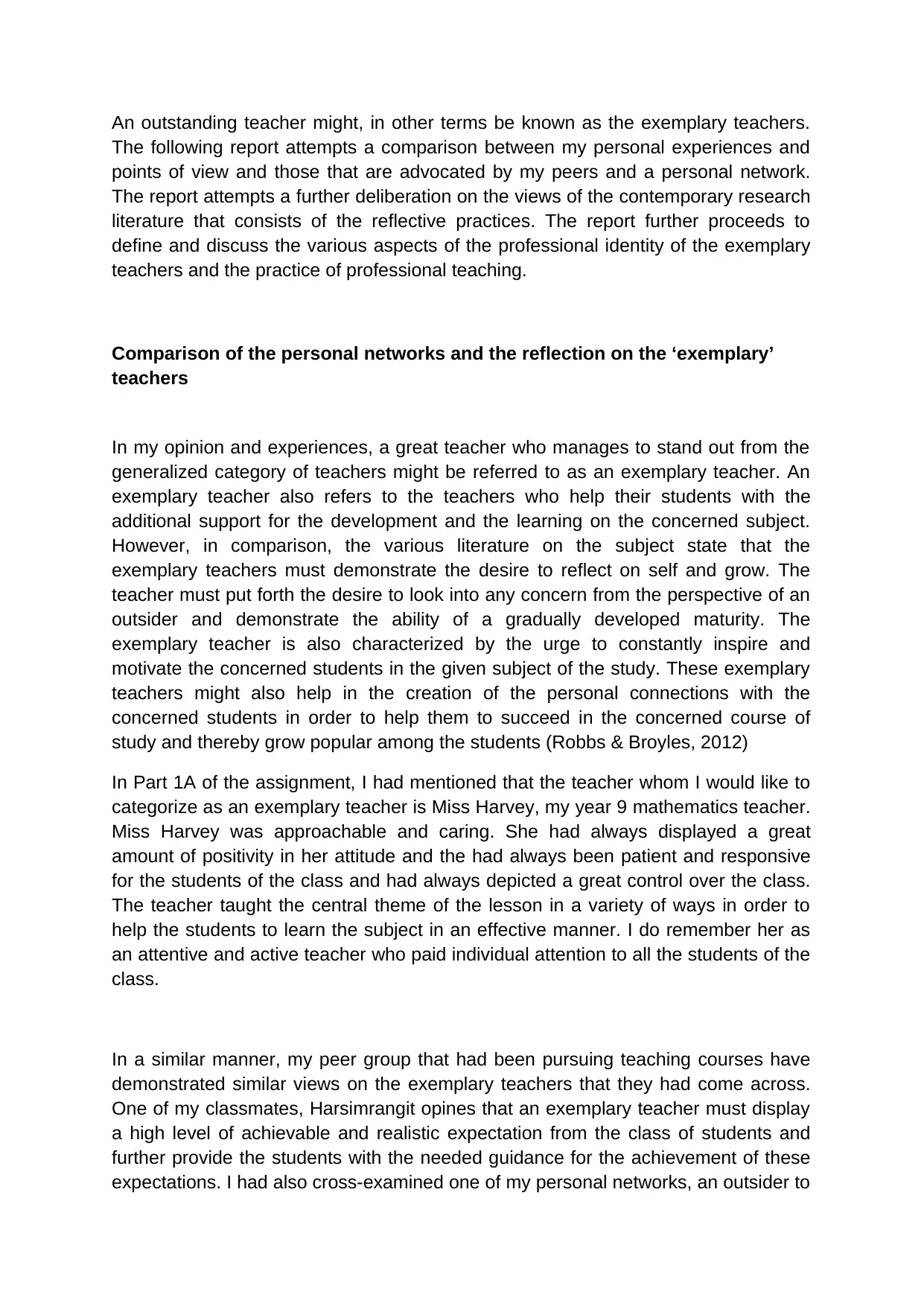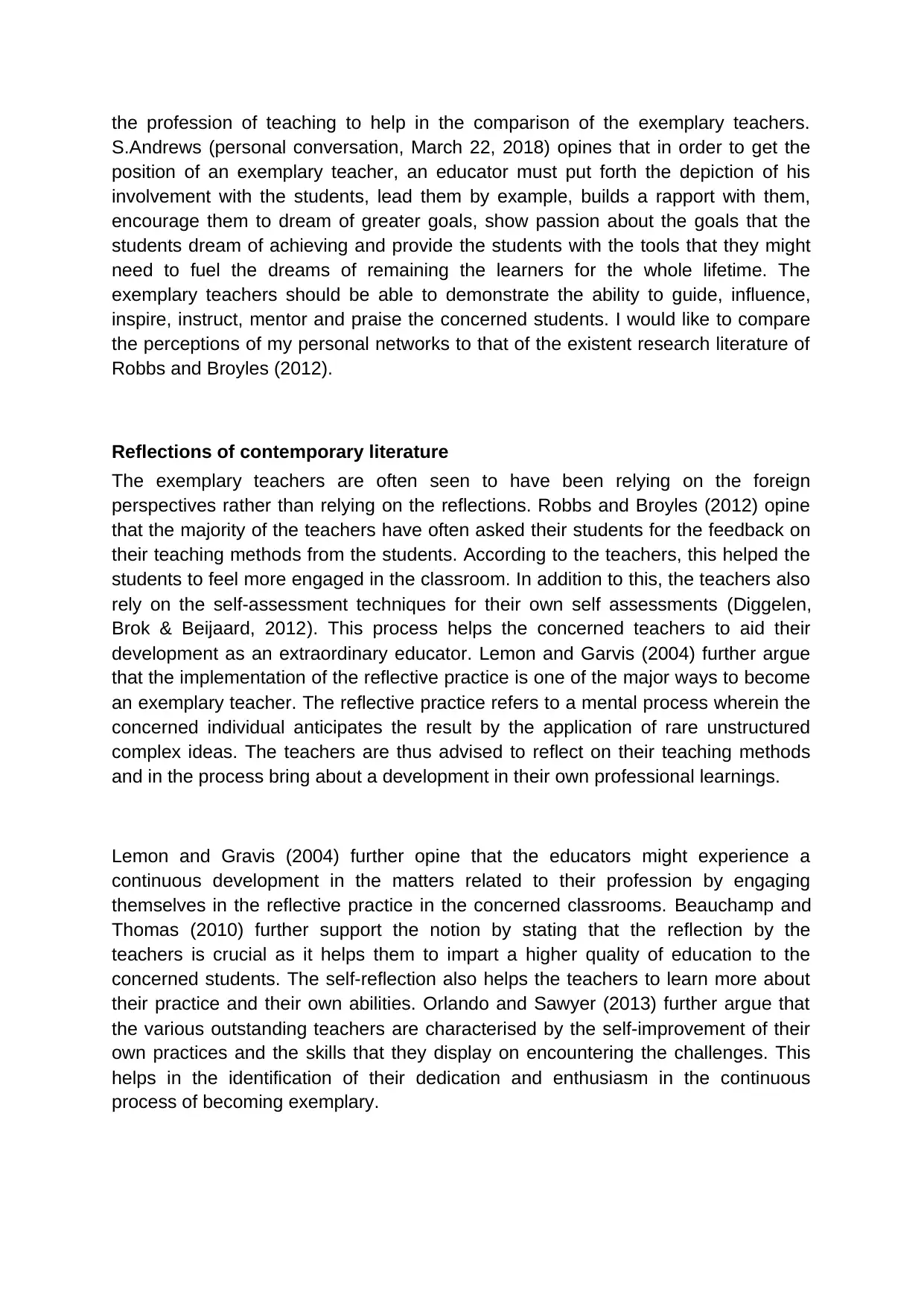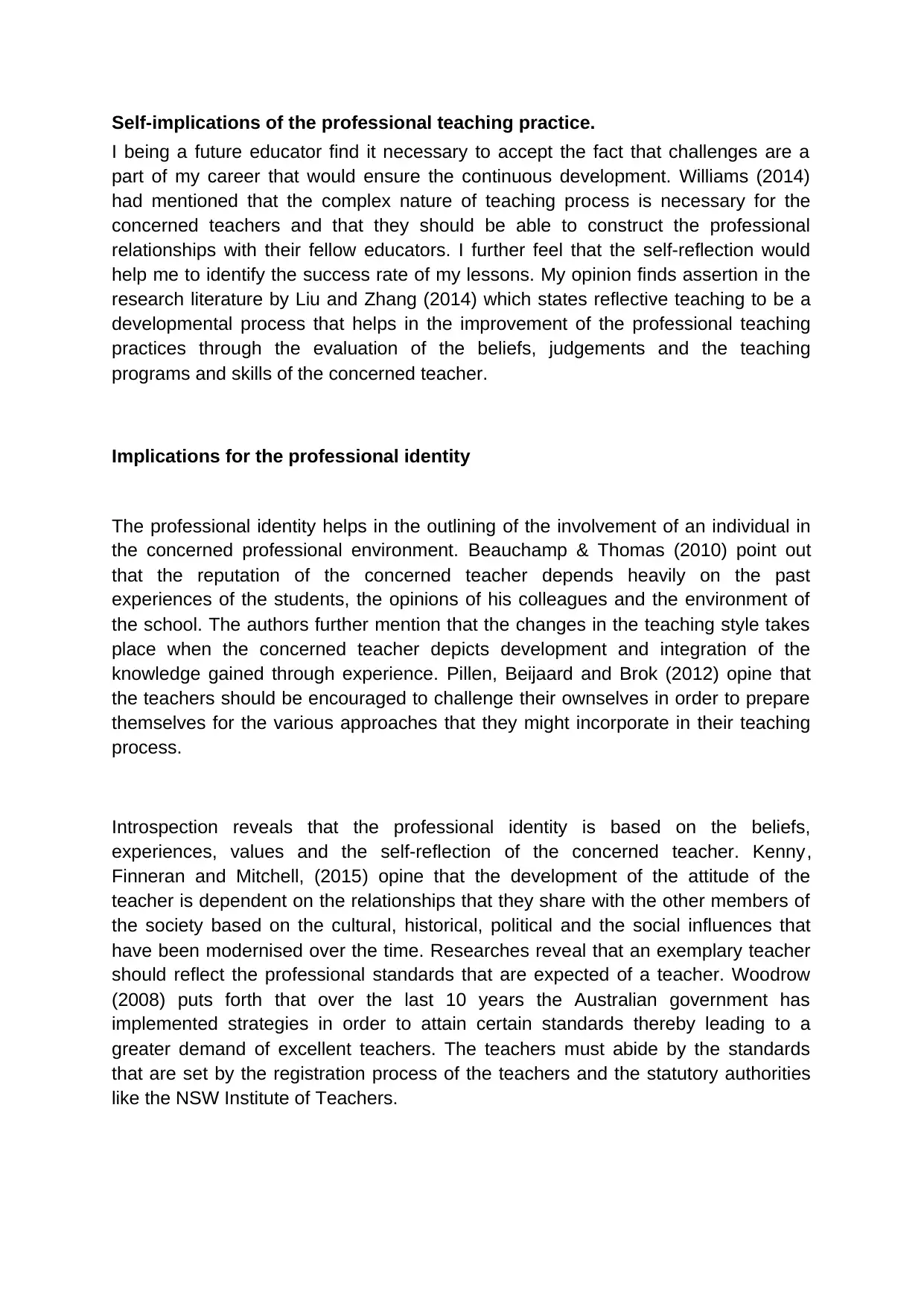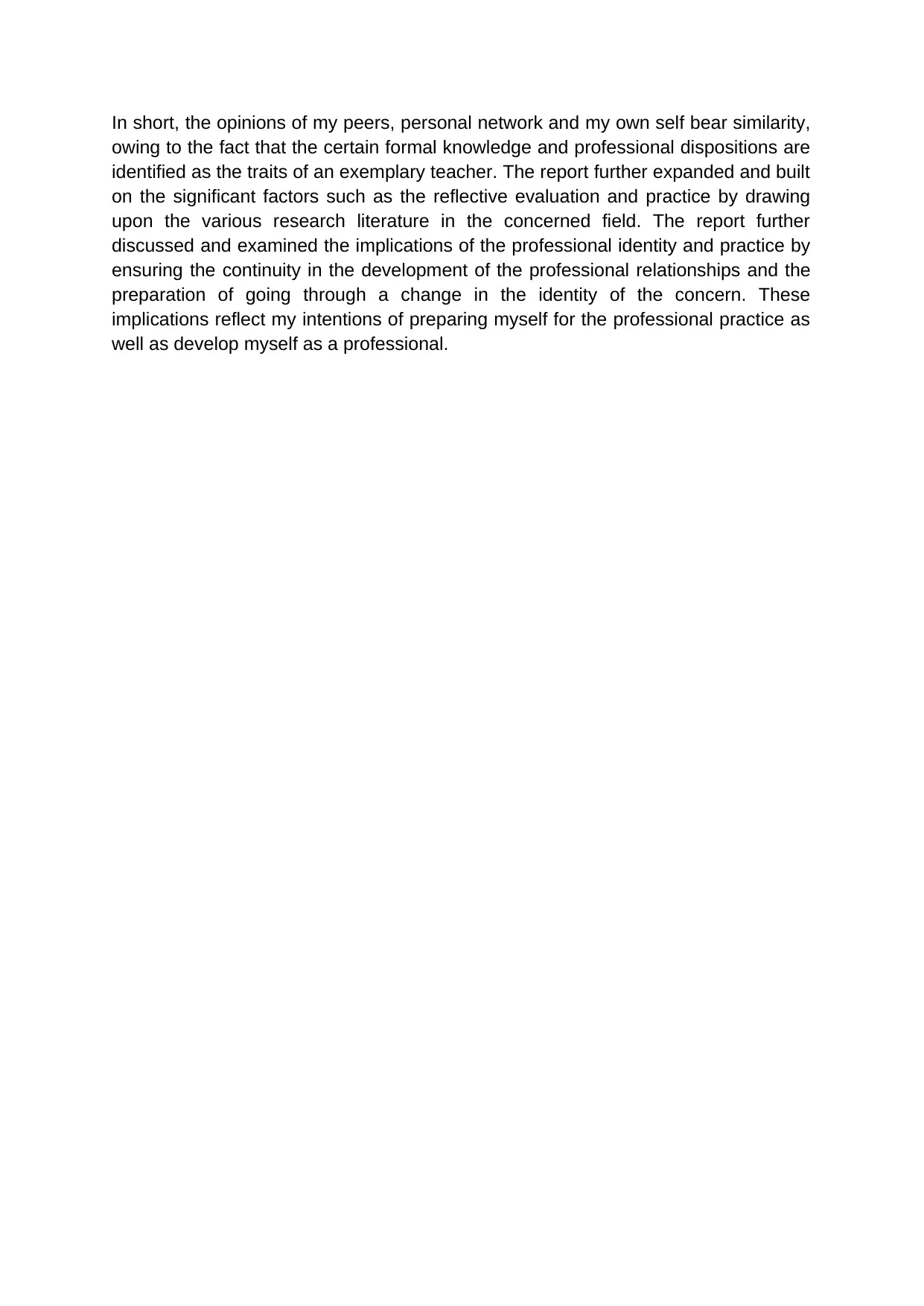Exemplary Teachers: Professional Identity and Practice Report
VerifiedAdded on 2021/04/21
|4
|1533
|91
Report
AI Summary
This report delves into the concept of exemplary teachers, comparing personal experiences and perspectives with those of peers, personal networks, and contemporary research literature. The report begins by defining exemplary teachers and exploring their characteristics, such as the ability to inspire, motivate, and connect with students. It then compares these views with research on reflective practices, highlighting the importance of self-reflection, feedback, and continuous professional development. The report further examines the implications of professional identity, emphasizing the impact of past experiences, colleague opinions, and school environment on a teacher's reputation and teaching style. It concludes by discussing the importance of adhering to professional standards and the continuous development of professional relationships to prepare for changes in professional identity and practice. The report aims to provide a comprehensive understanding of the qualities and practices of exemplary teachers.

An outstanding teacher might, in other terms be known as the exemplary teachers.
The following report attempts a comparison between my personal experiences and
points of view and those that are advocated by my peers and a personal network.
The report attempts a further deliberation on the views of the contemporary research
literature that consists of the reflective practices. The report further proceeds to
define and discuss the various aspects of the professional identity of the exemplary
teachers and the practice of professional teaching.
Comparison of the personal networks and the reflection on the ‘exemplary’
teachers
In my opinion and experiences, a great teacher who manages to stand out from the
generalized category of teachers might be referred to as an exemplary teacher. An
exemplary teacher also refers to the teachers who help their students with the
additional support for the development and the learning on the concerned subject.
However, in comparison, the various literature on the subject state that the
exemplary teachers must demonstrate the desire to reflect on self and grow. The
teacher must put forth the desire to look into any concern from the perspective of an
outsider and demonstrate the ability of a gradually developed maturity. The
exemplary teacher is also characterized by the urge to constantly inspire and
motivate the concerned students in the given subject of the study. These exemplary
teachers might also help in the creation of the personal connections with the
concerned students in order to help them to succeed in the concerned course of
study and thereby grow popular among the students (Robbs & Broyles, 2012)
In Part 1A of the assignment, I had mentioned that the teacher whom I would like to
categorize as an exemplary teacher is Miss Harvey, my year 9 mathematics teacher.
Miss Harvey was approachable and caring. She had always displayed a great
amount of positivity in her attitude and the had always been patient and responsive
for the students of the class and had always depicted a great control over the class.
The teacher taught the central theme of the lesson in a variety of ways in order to
help the students to learn the subject in an effective manner. I do remember her as
an attentive and active teacher who paid individual attention to all the students of the
class.
In a similar manner, my peer group that had been pursuing teaching courses have
demonstrated similar views on the exemplary teachers that they had come across.
One of my classmates, Harsimrangit opines that an exemplary teacher must display
a high level of achievable and realistic expectation from the class of students and
further provide the students with the needed guidance for the achievement of these
expectations. I had also cross-examined one of my personal networks, an outsider to
The following report attempts a comparison between my personal experiences and
points of view and those that are advocated by my peers and a personal network.
The report attempts a further deliberation on the views of the contemporary research
literature that consists of the reflective practices. The report further proceeds to
define and discuss the various aspects of the professional identity of the exemplary
teachers and the practice of professional teaching.
Comparison of the personal networks and the reflection on the ‘exemplary’
teachers
In my opinion and experiences, a great teacher who manages to stand out from the
generalized category of teachers might be referred to as an exemplary teacher. An
exemplary teacher also refers to the teachers who help their students with the
additional support for the development and the learning on the concerned subject.
However, in comparison, the various literature on the subject state that the
exemplary teachers must demonstrate the desire to reflect on self and grow. The
teacher must put forth the desire to look into any concern from the perspective of an
outsider and demonstrate the ability of a gradually developed maturity. The
exemplary teacher is also characterized by the urge to constantly inspire and
motivate the concerned students in the given subject of the study. These exemplary
teachers might also help in the creation of the personal connections with the
concerned students in order to help them to succeed in the concerned course of
study and thereby grow popular among the students (Robbs & Broyles, 2012)
In Part 1A of the assignment, I had mentioned that the teacher whom I would like to
categorize as an exemplary teacher is Miss Harvey, my year 9 mathematics teacher.
Miss Harvey was approachable and caring. She had always displayed a great
amount of positivity in her attitude and the had always been patient and responsive
for the students of the class and had always depicted a great control over the class.
The teacher taught the central theme of the lesson in a variety of ways in order to
help the students to learn the subject in an effective manner. I do remember her as
an attentive and active teacher who paid individual attention to all the students of the
class.
In a similar manner, my peer group that had been pursuing teaching courses have
demonstrated similar views on the exemplary teachers that they had come across.
One of my classmates, Harsimrangit opines that an exemplary teacher must display
a high level of achievable and realistic expectation from the class of students and
further provide the students with the needed guidance for the achievement of these
expectations. I had also cross-examined one of my personal networks, an outsider to
Paraphrase This Document
Need a fresh take? Get an instant paraphrase of this document with our AI Paraphraser

the profession of teaching to help in the comparison of the exemplary teachers.
S.Andrews (personal conversation, March 22, 2018) opines that in order to get the
position of an exemplary teacher, an educator must put forth the depiction of his
involvement with the students, lead them by example, builds a rapport with them,
encourage them to dream of greater goals, show passion about the goals that the
students dream of achieving and provide the students with the tools that they might
need to fuel the dreams of remaining the learners for the whole lifetime. The
exemplary teachers should be able to demonstrate the ability to guide, influence,
inspire, instruct, mentor and praise the concerned students. I would like to compare
the perceptions of my personal networks to that of the existent research literature of
Robbs and Broyles (2012).
Reflections of contemporary literature
The exemplary teachers are often seen to have been relying on the foreign
perspectives rather than relying on the reflections. Robbs and Broyles (2012) opine
that the majority of the teachers have often asked their students for the feedback on
their teaching methods from the students. According to the teachers, this helped the
students to feel more engaged in the classroom. In addition to this, the teachers also
rely on the self-assessment techniques for their own self assessments (Diggelen,
Brok & Beijaard, 2012). This process helps the concerned teachers to aid their
development as an extraordinary educator. Lemon and Garvis (2004) further argue
that the implementation of the reflective practice is one of the major ways to become
an exemplary teacher. The reflective practice refers to a mental process wherein the
concerned individual anticipates the result by the application of rare unstructured
complex ideas. The teachers are thus advised to reflect on their teaching methods
and in the process bring about a development in their own professional learnings.
Lemon and Gravis (2004) further opine that the educators might experience a
continuous development in the matters related to their profession by engaging
themselves in the reflective practice in the concerned classrooms. Beauchamp and
Thomas (2010) further support the notion by stating that the reflection by the
teachers is crucial as it helps them to impart a higher quality of education to the
concerned students. The self-reflection also helps the teachers to learn more about
their practice and their own abilities. Orlando and Sawyer (2013) further argue that
the various outstanding teachers are characterised by the self-improvement of their
own practices and the skills that they display on encountering the challenges. This
helps in the identification of their dedication and enthusiasm in the continuous
process of becoming exemplary.
S.Andrews (personal conversation, March 22, 2018) opines that in order to get the
position of an exemplary teacher, an educator must put forth the depiction of his
involvement with the students, lead them by example, builds a rapport with them,
encourage them to dream of greater goals, show passion about the goals that the
students dream of achieving and provide the students with the tools that they might
need to fuel the dreams of remaining the learners for the whole lifetime. The
exemplary teachers should be able to demonstrate the ability to guide, influence,
inspire, instruct, mentor and praise the concerned students. I would like to compare
the perceptions of my personal networks to that of the existent research literature of
Robbs and Broyles (2012).
Reflections of contemporary literature
The exemplary teachers are often seen to have been relying on the foreign
perspectives rather than relying on the reflections. Robbs and Broyles (2012) opine
that the majority of the teachers have often asked their students for the feedback on
their teaching methods from the students. According to the teachers, this helped the
students to feel more engaged in the classroom. In addition to this, the teachers also
rely on the self-assessment techniques for their own self assessments (Diggelen,
Brok & Beijaard, 2012). This process helps the concerned teachers to aid their
development as an extraordinary educator. Lemon and Garvis (2004) further argue
that the implementation of the reflective practice is one of the major ways to become
an exemplary teacher. The reflective practice refers to a mental process wherein the
concerned individual anticipates the result by the application of rare unstructured
complex ideas. The teachers are thus advised to reflect on their teaching methods
and in the process bring about a development in their own professional learnings.
Lemon and Gravis (2004) further opine that the educators might experience a
continuous development in the matters related to their profession by engaging
themselves in the reflective practice in the concerned classrooms. Beauchamp and
Thomas (2010) further support the notion by stating that the reflection by the
teachers is crucial as it helps them to impart a higher quality of education to the
concerned students. The self-reflection also helps the teachers to learn more about
their practice and their own abilities. Orlando and Sawyer (2013) further argue that
the various outstanding teachers are characterised by the self-improvement of their
own practices and the skills that they display on encountering the challenges. This
helps in the identification of their dedication and enthusiasm in the continuous
process of becoming exemplary.

Self-implications of the professional teaching practice.
I being a future educator find it necessary to accept the fact that challenges are a
part of my career that would ensure the continuous development. Williams (2014)
had mentioned that the complex nature of teaching process is necessary for the
concerned teachers and that they should be able to construct the professional
relationships with their fellow educators. I further feel that the self-reflection would
help me to identify the success rate of my lessons. My opinion finds assertion in the
research literature by Liu and Zhang (2014) which states reflective teaching to be a
developmental process that helps in the improvement of the professional teaching
practices through the evaluation of the beliefs, judgements and the teaching
programs and skills of the concerned teacher.
Implications for the professional identity
The professional identity helps in the outlining of the involvement of an individual in
the concerned professional environment. Beauchamp & Thomas (2010) point out
that the reputation of the concerned teacher depends heavily on the past
experiences of the students, the opinions of his colleagues and the environment of
the school. The authors further mention that the changes in the teaching style takes
place when the concerned teacher depicts development and integration of the
knowledge gained through experience. Pillen, Beijaard and Brok (2012) opine that
the teachers should be encouraged to challenge their ownselves in order to prepare
themselves for the various approaches that they might incorporate in their teaching
process.
Introspection reveals that the professional identity is based on the beliefs,
experiences, values and the self-reflection of the concerned teacher. Kenny,
Finneran and Mitchell, (2015) opine that the development of the attitude of the
teacher is dependent on the relationships that they share with the other members of
the society based on the cultural, historical, political and the social influences that
have been modernised over the time. Researches reveal that an exemplary teacher
should reflect the professional standards that are expected of a teacher. Woodrow
(2008) puts forth that over the last 10 years the Australian government has
implemented strategies in order to attain certain standards thereby leading to a
greater demand of excellent teachers. The teachers must abide by the standards
that are set by the registration process of the teachers and the statutory authorities
like the NSW Institute of Teachers.
I being a future educator find it necessary to accept the fact that challenges are a
part of my career that would ensure the continuous development. Williams (2014)
had mentioned that the complex nature of teaching process is necessary for the
concerned teachers and that they should be able to construct the professional
relationships with their fellow educators. I further feel that the self-reflection would
help me to identify the success rate of my lessons. My opinion finds assertion in the
research literature by Liu and Zhang (2014) which states reflective teaching to be a
developmental process that helps in the improvement of the professional teaching
practices through the evaluation of the beliefs, judgements and the teaching
programs and skills of the concerned teacher.
Implications for the professional identity
The professional identity helps in the outlining of the involvement of an individual in
the concerned professional environment. Beauchamp & Thomas (2010) point out
that the reputation of the concerned teacher depends heavily on the past
experiences of the students, the opinions of his colleagues and the environment of
the school. The authors further mention that the changes in the teaching style takes
place when the concerned teacher depicts development and integration of the
knowledge gained through experience. Pillen, Beijaard and Brok (2012) opine that
the teachers should be encouraged to challenge their ownselves in order to prepare
themselves for the various approaches that they might incorporate in their teaching
process.
Introspection reveals that the professional identity is based on the beliefs,
experiences, values and the self-reflection of the concerned teacher. Kenny,
Finneran and Mitchell, (2015) opine that the development of the attitude of the
teacher is dependent on the relationships that they share with the other members of
the society based on the cultural, historical, political and the social influences that
have been modernised over the time. Researches reveal that an exemplary teacher
should reflect the professional standards that are expected of a teacher. Woodrow
(2008) puts forth that over the last 10 years the Australian government has
implemented strategies in order to attain certain standards thereby leading to a
greater demand of excellent teachers. The teachers must abide by the standards
that are set by the registration process of the teachers and the statutory authorities
like the NSW Institute of Teachers.
⊘ This is a preview!⊘
Do you want full access?
Subscribe today to unlock all pages.

Trusted by 1+ million students worldwide

In short, the opinions of my peers, personal network and my own self bear similarity,
owing to the fact that the certain formal knowledge and professional dispositions are
identified as the traits of an exemplary teacher. The report further expanded and built
on the significant factors such as the reflective evaluation and practice by drawing
upon the various research literature in the concerned field. The report further
discussed and examined the implications of the professional identity and practice by
ensuring the continuity in the development of the professional relationships and the
preparation of going through a change in the identity of the concern. These
implications reflect my intentions of preparing myself for the professional practice as
well as develop myself as a professional.
owing to the fact that the certain formal knowledge and professional dispositions are
identified as the traits of an exemplary teacher. The report further expanded and built
on the significant factors such as the reflective evaluation and practice by drawing
upon the various research literature in the concerned field. The report further
discussed and examined the implications of the professional identity and practice by
ensuring the continuity in the development of the professional relationships and the
preparation of going through a change in the identity of the concern. These
implications reflect my intentions of preparing myself for the professional practice as
well as develop myself as a professional.
1 out of 4
Related Documents
Your All-in-One AI-Powered Toolkit for Academic Success.
+13062052269
info@desklib.com
Available 24*7 on WhatsApp / Email
![[object Object]](/_next/static/media/star-bottom.7253800d.svg)
Unlock your academic potential
Copyright © 2020–2026 A2Z Services. All Rights Reserved. Developed and managed by ZUCOL.





